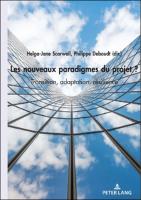Les nouveaux paradigmes du projet ?
Transition, adaptation, résilience
Contributor(s)
Scarwell, Helga-Jane (editor)
Deboudt, Philippe (editor)
Language
FrenchAbstract
Transition, adaptation, résilience : ces trois notions ont été choisies pour identifier et analyser dans cet ouvrage au travers de multiples contextes géographiques, échelles de l’action, figures d’acteurs et temporalité de l’aménagement, les nouveaux paradigmes du projet. La transition constitue le premier nouveau paradigme du projet analysé dans la première partie de l’ouvrage. La transition accompagne-t-elle la généralisation d’une inflexion du projet vers la préfiguration comme nouveau mode opératoire ? Le projet n’apparaîtrait-il pas comme une opportunité à saisir pour engager les villes et les territoires sur le chemin de la transition environnementale ? L’adaptation représente le second nouveau paradigme du projet constituant le fil directeur de la seconde partie de l’ouvrage. A la différence de la première partie dans laquelle les transitions ont principalement concerné le fait urbain et les villes, l’adaptation est envisagée pour des territoires plus diversifiés. Quelles sont les nouvelles figures de l’action, quelles sont les méthodes qui s’imposent en parallèle du projet pour envisager l’adaptation des villes et des territoires aux enjeux environnementaux et au changement climatique ? Dans la troisième partie, la résilience représente le dernier paradigme mobilisé. La notion même de projet a-t-elle encore du sens ou n’est-elle plus qu’une fiction, lorsque domine la vulnérabilité, l’inégalité, l’instabilité, l’incertitude ? Quels projets ou stratégies sont conçus et mis en œuvre dans les villes et les territoires pour assurer leur résilience ?
Keywords
adaptation; Deboudt; Helga; Jane; nouveaux; paradigmes; Philippe; projet; résilience; réversibilité; Scarwell; TransitionDOI
10.3726/b18045ISBN
9782807617735, 9782807617742, 9782807617759, 9782807611115, 9782807617735Publisher website
https://www.peterlang.com/Publication date and place
2021Classification
Regional and area planning
Human geography
Applied ecology


 Download
Download